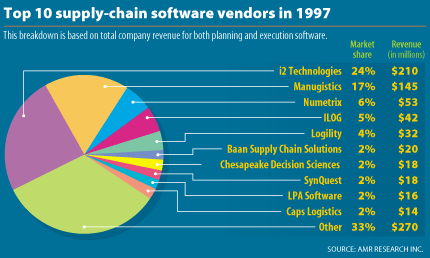|
Manufacturers are hot for supply-chain management (SCM). How hot are they?
The numbers are simply astonishing; Ninety-seven percent of the manufacturing
and distribution executives surveyed in a recent Forrester Research study consider
effective and efficient SCM to be critical to their companies long-term success.

However, only 14 percent of those surveyed have a supply-chain optimization
system in place. Not surprisingly, 53 percent intend to have a system in place
within two years and are willing to pay for it. What are these systems that
everybody wants but few have?
--------------------------------
A revolution is happening throughout the supply chain that connects retailers,
distributors, manufacturers, and raw-materials suppliers-a revolution in the
way manufacturers interact with partners, suppliers, and customers.
While most routine interactions in the manufacturing space still involve phone,
fax, or e-mail, these options are being replaced with electronic data interchange
(EDI) and Internet commerce.
The first round fired in the supply-chain revolution came when companies like SAP,
Oracle, Baan and DataWorks introduced enterprise resource planning (ERP). ERP
systems track inventory as products move from materials to manufacturing to inventory
to distribution.
The revolution continued when SCM applications from vendors like Manugistics
(Rockville, MD) and i2 (Irving, TX) took ERP to the next level. Besides
tracking inventory, SCM performs more complex analysis of data, allowing companies
to predict demand and adjust materials orders and production schedules accordingly.
Say a customer orders a larger supply of blue widgets than usual. SCM software
not only tells the customer when it will be delivered but also notifies manufacturing
to ramp up production for a few days and queries raw-materials suppliers to
determine how to best satisfy the demand.
Today big players like SAP and Oracle are opening their APIs to packaged-application vendors like Manugistics, i2, and Agile
Software (San Jose) while rushing their own packaged SCM solutions to market. Midtier ERP vendors like DataWorks (San Diego) are reaching out to new vertical- solutions partners that can sell solutions to new classes of customers. The midtier players also are moving down the chain by offering small, inexpensive ERP systems based on Microsoft's Small Business Server. Everyone in this market is struggling to make use of the Internet, thin graphical interfaces,
and tools for increased collaboration.
Extending Chain With Collaboration
Continued growth in the SCM arena depends on SCM software's ability to accommodate
larger groups-including suppliers and customers. This collaborative-planning
concept started when some big companies - Wal-Mart, Warner Lambert, and Ford-required
their suppliers to feed them data via private EDI systems. Those first few trials
proved wildly successful. When word got out, a stampede began. Companies large
and small began to look for ways to open up better lines of communication.
The true advantage of SCM lies in effective management of the entire supply
chain-from raw-materials suppliers through to the end consumer,proclaims Paul
Strzelec, Internet business manager at Manugistics. "Technology is no longer
the biggest hurdle-improving business practices and organizational structures
and setting up a culture that encourages safe coordination and collaboration
are. What information do I want to share, with whom do I share it, and with
what frequency do I release that information? We're spending a lot of time
helping customers work out these kinds of details."
Richard Barnett, director of the high-tech industries group at i2, agrees.
"It's an evolutionary process. We provide manufacturers with technology
that allows them to share information in new ways. That leads to concern that
information handed out to partners will be reverse-engineered-to provide manufacturers
with unfair insight into the capacity of their suppliers or to provide suppliers
with the true demand of the manufacturer. We need to move beyond those worries
and come up with new paradigms that allow partners to coordinate their efforts
in order to respond more quickly to highly volatile market conditions."
ERP AND SCM SOFTWARE FORECASTS
|
|
Total company revenue ($ billions)
|
Growth rate
|
|
|
1996
|
1997
|
2002
|
1996-1997
|
1997-2002
|
|
ERP
|
$7.5
|
$10.6
|
$50.5
|
41%
|
37%
|
|
SCM
|
$1.1
|
$1.6
|
$12.1
|
53%
|
50%
|
|
Source: Advanced Manufacturing Research
|
|
The Feta Cheese Strategy
"Setting up a good supply-chain system takes deep industry understanding",
warns Judy Sweeney, director of business relations at leading ERP-solution provider
Marcam Solutions (Newton, MA). "We're just now beginning to understand
the complexity of the measurements we take and the relationships between those
items. In the past, a lot of these supply-chain systems have not looked at interdependencies.
We are getting to the point that we can."
A case in point is the feta cheese problem experienced by one of Sweeney's
retailers. "Most supply-chain models tell him that he should dump feta
cheese from his line because other products produce more profit from the same
shelf space. What these models don't take into account is that feta cheese customers
purchase more than $100 in groceries per week. Dump feta cheese and you lose
those customers."
Without industry knowledge, the model is incomplete. SCM solutions require
deep trust among the partners involved with the collaborative planning network.
Feta cheese models are considered competitive secrets, and retailers are not
going to share them with suppliers or customers easily, adds Sweeney.
A combination of integration skills and industry knowledge are prerequisites
for entering the SCM arena. And while integrators can't ensure trust among supply-chain
partners, knowledge of the products and the process options will go a long way
toward gaining a customer's trust.
Joe Devlin is a partner in Armadillo Associates Inc., a solutions integrator
headquartered in Half Moon Bay, CA. He can be reached at Joe@armadillosoft.com.
|



